If there’s one ingredient you should always watch out for in your cosmetics and common household products, it’s fragrance.
Fragrance sounds nice. It conjures up images of smelling fresh flowers or breathing in the scent of clean morning air. But unfortunately, manufactured fragrance is not a pleasant thing at all.
Many of the fragrances you breathe in from manufactured products are synthetic. They are created in a lab from a mixture of chemicals. They often fall in the “How do you pronounce that?” category.
And the effects of many synthetic fragrances can be summed up in one word: toxic.
However, to get a better understanding of just how dangerous this seemingly innocent ingredient is and how it may be affecting your health right now, it’s worth taking a closer look at the world of mass-produced scents.
The Truth About Fragrance
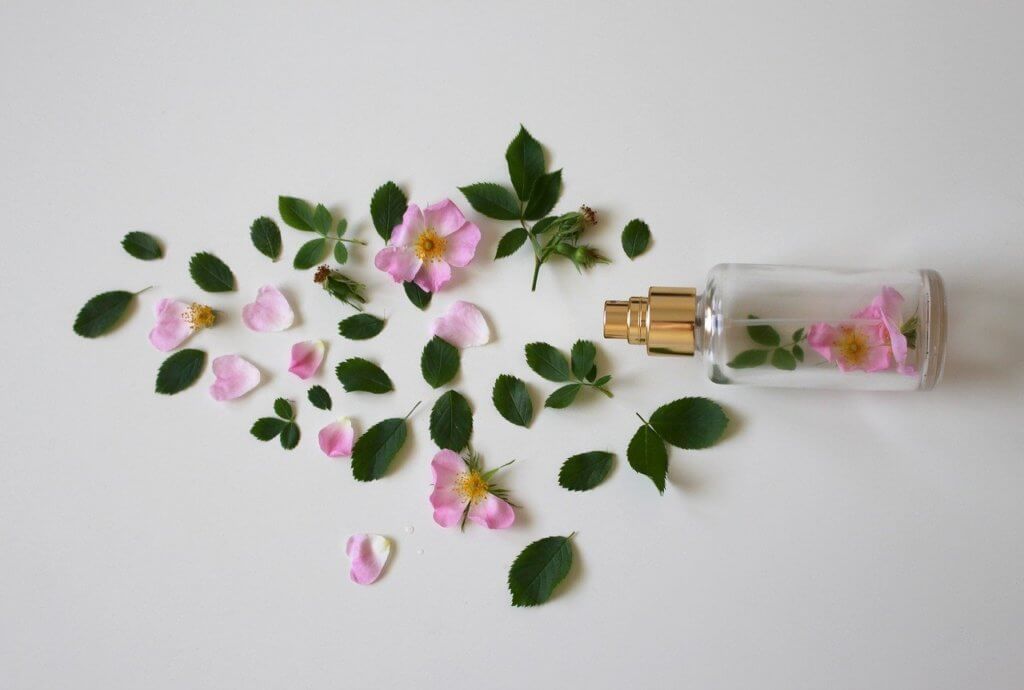
If you make a habit of scanning labels to catch toxic ingredients, you probably have some specific ones you look for. Maybe it’s artificial flavoring and MSG in food products or sulfates in personal care products.
But what throws a lot of people off, even the health conscious ones, is finding the word “fragrance” on an ingredient list (sometimes, it is instead listed as “scent” or the really-fancy-sounding “parfum.”)
Now, “fragrance” isn’t unpronounceable. It doesn’t sound like a harmful ingredient. And maybe if all or most of the other ingredients check out, you buy the product anyway.
This is an unfortunate trap that many people fall into. And it exists because companies often don’t want you to know what really goes into their products.
As briefly mentioned, synthetic fragrances are actually a mix of many different chemicals. According to the Environmental Working Group (EWG), the average product containing fragrance has about 14 additional chemical ingredients not listed on the label.
This means you have no way of knowing which chemicals make up the word “fragrance” in a specific product.
There are over 3000 possible chemicals that could be in a fragrance cocktail, many of which are derived from petroleum (yes, petroleum, the same ingredient at the base of gasoline, motor oil, jet fuel, asphalt, bicycle tires, and more… and the alarm bells should be ringing already!)
None of these chemicals in “fragrance” have to be disclosed to you, the consumer, because they are protected as “trade secrets.” And that alone should be enough to make anyone wonder what the manufacturers may be trying to hide.
Most Common Products Containing Fragrance
Before getting into the specific dangers of fragrance, here’s a look at where it’s most likely hiding out in your home. Be warned: If you start checking labels for this ingredient, it will probably turn up in more places than you think.
Perfume and Cologne
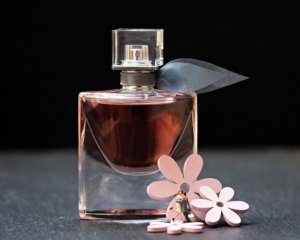
Perfume and cologne are two products that are obviously loaded with fragrance chemicals. After all, their sole purpose is to smell appealing.
In a report by the EWG, some of the top brand name perfumes and colognes contained as many as 24 secret chemicals — in a single product. What’s really concerning is that some of these chemicals (like diethyl phthalate and musk ketone) are known to accumulate in human tissues.
This means that if you use any of these products regularly, the toxins may well be building up in your body.
Cosmetics
There are many toxins lurking in cosmetic products. Fragrance is one of them, showing up in anti-aging creams, moisturizers, lip gloss and many other products. NOTE that even cosmetics that don’t smell like much often contain fragrance to mask the smell of other synthetic chemicals used in the formula.
If you do apply creams and makeup to your face, just think about how often you wear it and how long it spends “sitting” on your skin. Of course, it is NOT just “sitting” there — your skin absorbs much of what you apply to it into your body. That is, you literally eat much of what you feed your skin. Your exposure time to toxic fragrance in cosmetics can obviously add up quite quickly!
Other Personal Care Products
Personal care products are another huge problem when it comes to fragrance. Nearly any conventional product you apply to your body that has a scent will contain fragrance chemicals.
For example, one report from 2011 found that more than 95% of shampoos, conditioners, and hair styling products contain fragrance. And that’s not even counting soap, deodorant, sunscreen, and the many other products you likely use every day.
Candles and Air Fresheners

Like perfume, candles and air fresheners are designed specifically to smell nice. Except, of course, they “freshen” your home instead of your person.
Not surprisingly, these two products are also major sources of toxic fragrance in homes.
In fact, one study from 2011 that examined 25 scented products, including air fresheners, found 24 chemicals that are classified as toxic or hazardous by U.S. regulations. Most notably, none of these chemicals were on the label. They were all hiding under the word “fragrance”.
Cleaners and Laundry Products
Ironically, many cleaning products contain such harsh-smelling (and toxic) chemicals that manufacturers add even more chemicals to mask the smell. It can actually be difficult to find an unscented cleaner because fragrance is so prevalent.
Laundry products are also a major concern. Detergent, fabric softener, and dryer sheets frequently contain synthetic fragrance. They cause problems both inside and outside the home, since products are typically vented outdoors.
Dangers of Toxic Fragrance Chemicals
Absorbed Through Your Skin
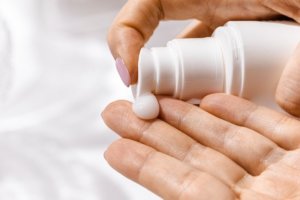
One of the biggest dangers of fragrance comes from skin contact.
A growing body of research is indicating that scented products are one of the biggest triggers for allergies in the world. The report, which was from 2016, found that about 1/3 of participants experienced some kind of allergic reaction to fragrance.
This is bad news if you have sensitive skin.
Contact dermatitis (an allergic skin reaction) is one of the most common symptoms of applying a fragrance product topically. Other reactions include hives, sinus problems, and migraines.
Another concerning issue referenced earlier is that fragrance chemicals can also be absorbed into your body through your skin. Those that are small enough will even enter your bloodstream. And as mentioned, several of these chemicals are known to accumulate in human tissue.
The specific dangers?
Besides allergies, these toxic chemicals may increase your cancer risk. One common one called styrene, for example, is considered a human carcinogen, and plenty of others are potential carcinogens.
Other fragrance chemicals are also endocrine disruptors, which means they can alter your hormones, causing all kinds of damage. Some are even linked to birth defects and child developmental issues through prenatal exposure.
Breathed Into Your Lungs
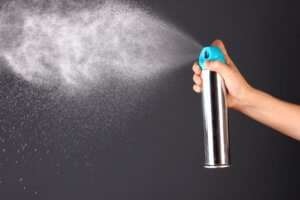
Fragrance products like air fresheners are one of the top contributors to indoor air pollution. They emit chemicals known as VOCs (short for volatile organic compounds) that are very toxic to your lungs and the rest of your body.
Even other products that you wouldn’t think of as airborne can still get into your lungs. Perfume and cleaning chemicals, for example, are often sprayed and easy to inhale. Scented laundry products get vented outside and can be breathed in by anyone nearby (and pay attention to this if you ever go to laundromats, too!)
Unsurprisingly, one of the biggest dangers of fragrance products is lung irritation or damage.
Just being exposed to cologne was enough to worsen asthma symptoms according to one study. Other research on VOCs, which includes certain fragrance chemicals, indicates that exposure can increase the risk of chronic respiratory problems in children.
Other common reactions to inhaling synthetic fragrance include migraines, dizziness, and congestion.
If that weren’t enough, fragrance products also release compounds that react with ozone to form secondary pollutants. This includes formaldehyde and acetaldehyde — both of which are carcinogens.
Damaging to the Environment
While this article is mainly focused on the toxic nature of fragrance for human health, it’s important not to forget about the effects chemicals have on animals and the environment.
Fragrance chemicals are most likely going to end up either in the indoor atmosphere of your home or in the outdoor world. They get washed away, sprayed into the air, vented directly outdoors, and so on. And that’s not even counting how many chemicals “escape” during the manufacturing process.
The same chemicals that accumulate in your body can also build up in the ground, water, insects, and animals. Ironically, this eventually comes back around to humans through the food chain and also does untold damage in the meantime.
Most Common (and Problematic) Fragrance Chemicals

Phthalates
Phthalates are linked to a variety of health issues, such as wreaking havoc on hormones, developmental and reproductive toxicity, and even cancer. They also appear to cause sperm damage and are linked to lower IQ in children who had prenatal exposure. Phthalates are banned in many other countries, but they’re a common ingredient in many fragrances in the U.S. (See more about phthalates right here.)
Synthetic Musks
Musk is a popular scent, but the synthetic forms are awful for your health. They are known to accumulate in the environment, human fat tissues, and breast milk. Some of the most used musk chemicals are endocrine disrupters, toxin to the brain and lungs, and are linked to reproductive toxicity.
Look for them under the names galaxolide, musk ketone, tonalide, and musk xylene.
Styrene
Styrene has a sweet scent but may be toxic to your lungs when inhaled. It’s also a probable human carcinogen, endocrine disruptor, and can be toxic to red blood cells and your liver. Unfortunately, styrene is very commonly used in fragrance products.
Formaldehyde
Formaldehyde is a human carcinogen and may also cause skin irritation. It’s still used in product in the U.S. (despite being banned in many other countries). It may be present in small amounts in fragrance or form when other compounds react with ozone.
Acetaldehyde
Acetaldehyde has a fruity smell — and is listed as a probable human carcinogen. It may also cause kidney, reproductive, nervous system, and respiratory damage. Like formaldehyde, acetaldehyde can form after a reaction of fragrance compounds with ozone.
Chloromethane
This chemical can have acute and chronic effects on your nervous system. It may also affect your liver, kidneys, and skin and may have developmental toxicity as well. Like the other chemicals, chloromethane is commonly used in household fragrance products.
The List Goes On
This just scratches the surface of possible fragrance chemicals and their negative effects. This list could run a lot longer, but you get the picture of just how harmful synthetic scents can be for your health.
Why Are Toxic Fragrance Chemicals Allowed?

At this point, you may be wondering how all these harmful chemicals can end up in fragrance.
The truth of the matter is that cosmetics, personal care products, and even home goods are all highly unregulated industries. The U.S. FDA has placed few restrictions on chemicals that are considered harmful and banned in other countries.
In fact, cosmetic ingredients are not required to demonstrate they are free of harmful effects before going on the market. Essentially, it is the reverse — chemicals must be shown to cause extensive harm, often over long periods, before restrictions are even considered.
Even then, compliance may often be voluntary for companies, or it takes years for the government to phase out chemicals.
To make things worse, companies do not have to disclose fragrance ingredients on the label because they are considered a “trade secret”. This makes it impossible for you, the consumer, to even make an informed decision. (Fortunately, the FDA may be moving in the direction of at least requiring companies to disclose potential allergens in fragrance.)
Until companies change their policy and list all the ingredients in their products, the best choice you can make is to avoid fragrance altogether.
And to be honest, things are unlikely to change much because those synthetic and often harmful chemicals are far more profitable for companies than natural fragrance ingredients. Most companies likely won’t give up this cost savings easily.
How to Avoid Toxic Fragrance + Better Choices
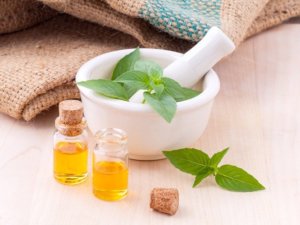
When it comes to avoiding fragrance, the best option is to look for USDA Certified Organic products — see more on this below.
It is also important to read ingredient labels.
First, do a quick scan to see if fragrance (or scent, or parfum) is listed in the ingredients. If it is, do your health a favor and don’t buy the product (or get rid of it if it is on your shelf).
A few companies will actually list the ingredients in their fragrance, either on the label or on a website. In this case, you can put any you aren’t sure about through EWG’s Skin Deep database to see if they are toxic.
Something else to beware of is “fragrance-free” products. Remember that labeling is mostly about marketing — not information. Products may have chemicals added to mask the scent of other ingredients so, sure, it has no scent — but that does not necessarily mean free of synthetic chemicals masking the scent! Once again, check the label, and if in doubt, don’t buy the product.
Also, be on the lookout for greenwashing. This is the practice of using words like “organic” and “natural” in marketing to make you believe the product is entirely natural or organic. However, they may actually only have one or a few natural or organic ingredients in the product — along with many synthetic ones! (Again, read those labels closely and see below regarding CERTIFIED organic.)
So what should you look for?
The smartest step is to look for USDA Certified Organic cosmetics/personal care products if you live in the U.S.
This ensures — in a strict process independent of the companies involved in selling the product — that the products don’t contain potentially harmful ingredients, including those otherwise often found in “fragrance.”
Instead, USDA Certified Organic products will often use organic essential oils or organic plant extracts to give the product a genuinely pleasant scent!
And if you are looking for USDA Certified Organic skincare…
No Fragrance Added, USDA Certified Organic Skincare
 If you are looking for highly effective anti-aging skincare without dubious ingredients — including NO synthetic fragrance — note that ALL Purity Woods’ products are USDA Certified Organic.
If you are looking for highly effective anti-aging skincare without dubious ingredients — including NO synthetic fragrance — note that ALL Purity Woods’ products are USDA Certified Organic.
This includes the #1 bestselling USDA Certified Organic Age-Defying Dream Cream, which provides your skin nature’s most potent ingredients to stop and reverse the appearance of fine lines, wrinkles, age spots, loose-looking skin and more.
The unique and powerful ingredients in the Age-Defying Dream Cream include organic maple leaf extracts, which may be nature’s most effective way to boost your skin’s elastin.
It includes organic Indian Gooseberry (a.k.a. amla), which is outstanding for helping your skin’s collagen, and it includes organic astaxanthin, which comes from red algae and may be nature’s top ingredient for reversing the appearance of weathered-looking skin.
You’ll see all the remarkably effective botanicals in the Age-Defying Dream Cream — which is USDA Certified Organic, meaning free of synthetic fragrance, other synthetic ingredients, pesticides and herbicides, and any junk you don’t want in your body — right here!
And beyond the certified organic skincare products at Purity Woods, do consider looking for certified organic personal care products, truly natural-ingredient perfumes, and fragrance-free and toxin-free air fresheners, cleaners, laundry products, and more.

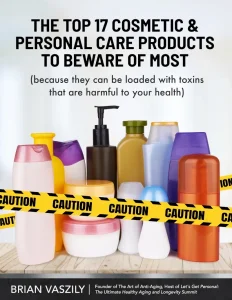
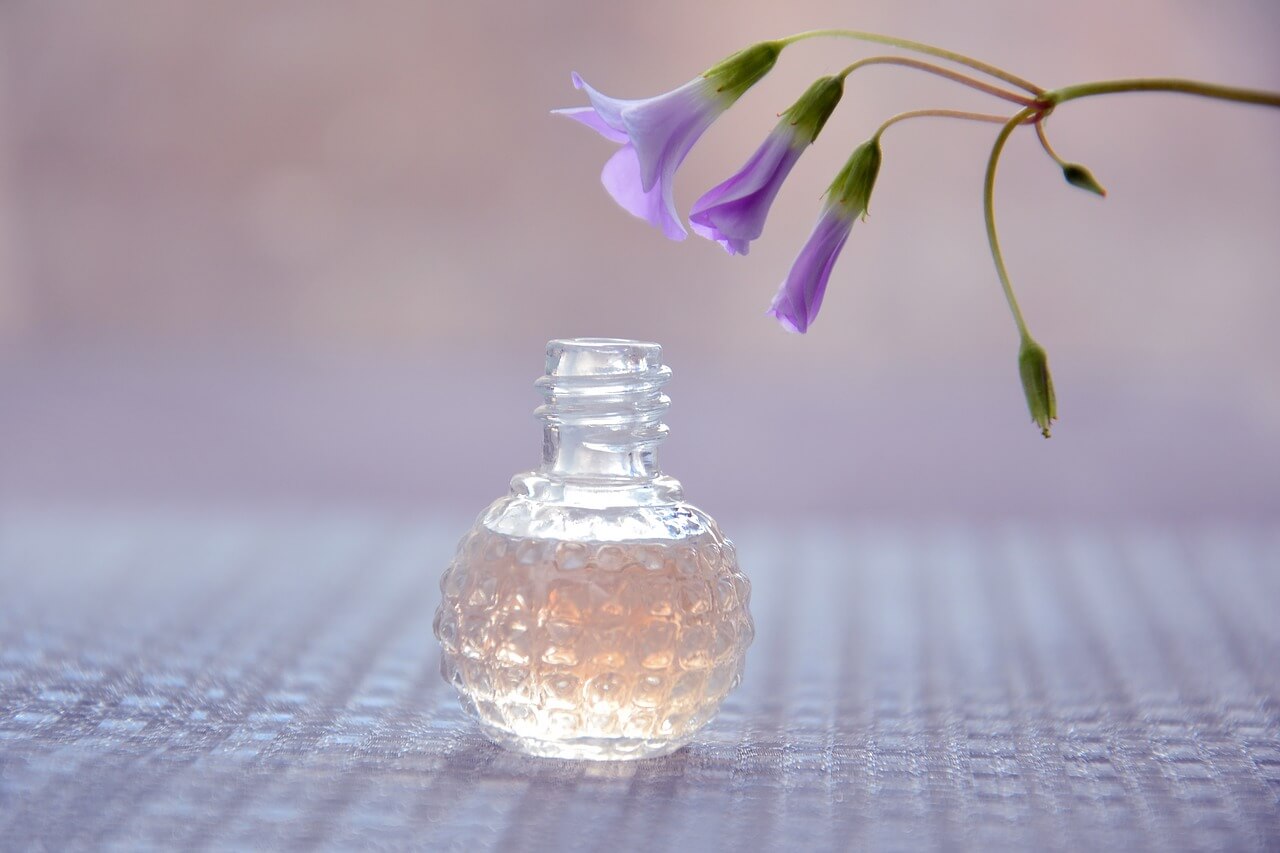
Thank you
Which perfume brand that doesn’t have fragrance?
Hi Tarisai, many just use essential oils, some use perfumes that use natural essential oils only… you can do an online search for things like “toxin-free perfume” or “fragrance-free perfume.”
Thank you Brian for your very interesting and important messages.
Talcum powder is safe to use. Been using it for many years. My government cares and looks after me. They would not let any bad things be put in my cosmetics because if I get sick it costs them a lot of money – hospitals and medicare. HA HA. Just read that my talc has Parfum.
Seriously now, I like your articles and this page where I can re-read articles in top RH corner. Thanks
HAHAHA! ; )
The only problem with talcum powder is that it can be absorbed into your lungs when it’s floating around in the air. The mother of a friend of mine got lung cancer, but never smoked, and her doctor traced it to her daily use of talcum powder!
Talcum Powder is not to be recommended either. It can seriously affect the lungs…i did not know this, when I was using it on my infants.
None. But doTERRA has pure tested and trusted essential oils.
doTERRA has a few “perfumes” that are made from pure essential oils.
I would advise using essential oils- there are some great recipes you can blend or find one that is already blended that you enjoy.
I read recently in order to have truly pure essential oils, we would have to spend hundreds of dollars per bottle, and many people are allergic to essential oils also and they can be very toxic. So I don’t know what to think. I have MCS for past 30 years and I am growing very sensitive to most essential oils now, except for Dottera lemon and some orange oils.
Here the same. I live in the Netherlands. Life is very toxic for us M.C.S. patients.
There were perfumes long before these toxic chemicals came to use. “Perfume” isn’t the culprit. Perfume was made from natural substances like essential oils back as far Cleopatra and further.
The problem is products containing “fragrance” and/or “parfum” i/e/. synthetic fragrance in their ingredients. These are unregulated ingredients that almost always contain harmful substances. The amounts may be small, but repeated use or mixed exposures can bring on health issues to people, animals, and the planet in general.
Thank you for the informative article. How about aromatherapy and essential oils, are there any downsides associated with essential oils?
Hi Aigul, first it must be noted that there is not a single ingredient / plant on earth that someone somewhere is not allergic or sensitive to. Regarding essential oils, there are certainly some that can cause reactions with excess application / inhalation / consumption (they need to be diluted etc). Because there are so many essential oils it would be a book to cover here, but if you are using oils and wonder it is wise to search online, for example, for any precautions about that oil. Or, read any number of the great guides on essential oils out there, such as Eric Zielinski’s.
Thank you for this statement. I was also wondering if using essential oils may cause different reactions in the skin.
It only takes 26 seconds for toxic chemicals to enter your bloodstream through your skin. I use water, ACV and all natural products which I research. My husband has MCS (multiple chemical syndrome) so I have had to be extremely careful.
thank you for this article!
I intend to pass it òn.
the level of ignorance ìs
astounding
This is probably why I sneeze entering the aisles in the super market that have
the detergents, household cleaners, scented candles and air fresheners!
It’s so nice to have the essential and pure carrier oils on the market to use.
My husband walked into my sitting area once, just after I had applied some
nice essential oils and wrinkled up his nose, “What’s that smell?” I said, “That’s
the smell of a very expensive spa and wellness center!”
However, we have to be more careful than ever when good old ‘lemon’ and
‘rose’ can be chemically duplicated… even cinnamon, cloves, and other arromatic
spices. I believe that when we listen to our bodies and train them to be
sensitive to the ‘crap’ we can avoid more and stay healthier!
Thank you. I have a lot of home scent bottles with sticks, received as gifts, which literally give me migraines. So I won’t use them or give them to others. But I don’t know how to dispose of them safely. Can you advise. And I cannot walk past shops cleaning with cheap floral bleach without feeling sick. I thought I am just extra sensitive. But I hadn’t considered makeup. I don’t wear much, but I will check everything.
Hey Lia, I also find these things bother me and I never purchase them, but when I receive them as gifts, I re-gift them to people I know who use those scented products anyway.
I just think that if someone I know purchases that kind of stuff anyway, then it’s better to let them use the one I was gifted rather than throw it in a landfill if they are going to buy something similar anyway. But I do normally try to convince friends not to use that type of thing.
Great article, thank you!
Great information! Even this old “dog” learned some new tricks from your article. I have issues
with these “sickening” products mentioned and plan to do some HOUSE CLEANING. ie tossing out these culprits!
Thanks!
Patricia
A few years ago, I decided to detox my internal and external environment. It was an eye opening experience. I discovered that even the everyday things that I took for granted as being safe and healthy contained toxic fragrances. In your article you played detective, and provided detailed information about what the toxins are and their effect on the body as well as gave helpful strategies on how to delete fragrances and toxins. Brian, you have saved people that want to clean up their external environment much time and the ability to live a healthier lifestyle in less time. Brilliant, that you so much!
PS
I recommend that people wanting to detox their environment be gentle with themselves as this can take some time and additional money to replace things like cleaning supplies, etc.
Thanks for increasing awareness. “Consumer products such as shampoo, cleaning products and paint now contribute as much to urban air pollution as tailpipe emissions from vehicles, according to a new study led by NOAA and including researchers at the University of California, Davis.” The results were published Feb. 16, 2018 in the journal Science. https://www.ucdavis.edu/news/consumer-industrial-products-overtake-transportation-source-urban-air-pollution Think about this the next time your city/state has a smog alert.
Keith
Very informative article that I will share. I also learned a lot from your Summit.
Thanks,
Mary
As a manufacturer of essential oil-based personal care products for over 30 years, I’d like to share that it is also important to be aware that the cosmetic industry (including most chemists and formulators) make absolutely NO distinction between pure essential oils derived from plants, and the synthetic fragrance oils that they are familiar with.
MANY products labelled as containing ‘essential oils’ actually contain only similar-smelling fragrance oils concoctions (even the really big companies are guilty of this.) It is very frustrating to hear people state that they are ‘allergic’ to essential oils when they then show me the ‘essential oil’ based products they are allergic to, which inevitably contain just conventional cosmetic chemicals plus synthetic fragrance oils. Be on the lookout for these imposters, educate yourself as to how real essential oils smell so that you know the difference. Sensitivity to pure essential oils is relatively rare, and they are definitely the superior choice over synthetic fragrance oils, including those falsely marketed on the product packaging as ‘essential oils.’
Dr. Eric Zielinski’s books and website provide an excellent introduction to true essential oils and their proper uses….I recommend his work.
Thanks for that distinction. I have a massage studio & require clients not to use fragrance. Hard to enforce, people are mostly clueless. Even the CDC has banned the use of fragrance in all their facilities.
I shall be passing this on, especially to people who use sprays. I have often wondered what was in ‘parfum’ etc. Happily we have good local health shops (in the UK) that sell cleaning products which are much better. Faith is a well-known brand here for SLS-free and other nasties-free shampoo and conditioner. Aloe Pura makes non-paraben skin products, including sun block.
Thanks Brian for this article. My next step is to do a thorough product check from household cleaners to personal use products. Also thanks for a fabulous Summit. You are much appreciated and your dad jokes too!
Somehow, this information is not at all new. I’ve known about this for many, many years now which is why I never use any fragranced product in my home or on my skin or family’s. Over the years, I’ve warned people about this but they just totally ignored me. Which makes me realize that is why they are all sick except me and my family. Funny, huh?
I just used some alcohol disinfectants that had fragrances. Even after I washed my hands multiple times with soap and water, that fragrance is still strong on my hands. I plan to toss this since the lingering smell concerns me (and gives me a little headache).
Brian, thank you for this indepth and easily understood article. You’ve certainly opened my eyes to the amount of toxic products that are in my home….. from scented soap to scented body lotions and make up, and that’s without even mentioning the huge quantity of cleaning products. OMG! because of Covid and the current rigid lockdown rules here in Sydney Australia I’ve bought extra of each product. Now I’ve got decisions to make about whether I use these extras up, then go “clean” or just toss them and start “clean” now. Living on a disability pension with money so limited is the crux of my decision but I will definitely go “clean” soonest. Thank you again Brian. I’m enjoying these talks.
Just to give you a little more to think about, talc is NOT safe. It contains asbestos. I’m not certain, you may have been poking fun with the government looking after you since talc products have been in litigation. You can google the dangers of talc and you will find a lot of information. Many cosmetics (blush, face powder) contain talc. As for your body powder you are safer with cornstarch although it doesn’t feel as good.
Good luck!
Thank you for this accurate and informative article. I intend to share with our friends and family who Oooh-Pooh my adult son’s severe reactions to many products, especially those which are endrocrine interrupters. Fabric softeners will bring him to his knees. He suffers from multiple chemical sensitivity syndrome, which is not a minor illness. He is also sensitive to many essential oils and all of the Italian seasonings.
I am becoming addicted to reading these articles. Thank you again as my job involves cleaning and we use many chemicals with fragrances. Will definitely take note.
My husband and I stayed in a Mexican hotel that had an automatic spray scent. After being exposed to it we could not even remember our phone number when asked in the lobby. We immediately removed the dispenser and placed it outside for the rest of our stay. We thankfully regained our acuity directly after some fresh air. My son also had memory problems after burning a scented candle for a period of time. I am not sure of the science behind it but we know it was the scents.
Where can I buy fragrence-free cleaning and house-hold products ?
Every item in the stores (floor cleaners, even garbage bags are scented!!!
As a person with asthma, these are very harmful.
Hi Eva, I was ready Brian’s article and came across your comment. I have great info and resources to share with you. I’m a Registered Nurse who detoxed myself, my home and family and would be happy to share the info with you as it is life changing!
Make your own cleaning products. I mop my house with water and quarter cup of distilled vinegar and add a few drops of dish soap for tile or linoleum floors. There are recipes online to make your own cleaning supplies. I did a new one a few days ago. Been doing these since 90s.
I suffer from severe osmophobia induced migraines so everything in my house (cleaning, laundry, skincare, etc) is now scent free. Most essential oils don’t bother me so I use them for medical/aromatherapy occasionally. In recent years it got so severe that I could smell my husbands hair from across the room. Going to an enclosed public place like a store or restaurant can go bad very quickly.
Thank you! Thank you! Thank you!
Laundry dryers are blowing these fragrances throughout our neighbourhoods.
The unhealthy fog blankets where we live, work and play literally 24/7.
Every time I work outdoors , I am assaulted by these scents. The level of ignorance, or should I say level of subservience to to the corporations peddling these unhealthy laundry products as highly desirable is mind boggling. Don’t get within 12 feet of anyone at a theatre or the gym etc. unless you want to be bowled over by the sickening scent of their fragrance drenched clothes.
Thank you, Brian, for all of your very helpful messages.
I have always wondered if dryer sheets and fragranced laundry have impacted our babies when snuggling into the blankets and sheets and experience unexplainable death. We may not know the answer to that question, but I do wonder.
Are there any statistics on that sydrome before the invention of dryer sheets ?
What I do know is, you can repell bees from your mailbox by throwing in a couple dryer sheets.
Happy to hear you spreading the word. My husband and I were on a vacation where there was an automatic scent spritzer. It sprayed out fragrance every 5 minutes or so. We realized that we needed to get it out of the hotel room when we both couldn’t remember our phone number. Life improved the minute there was fresh air again. The amazing thing is that these chemicals are effecting everyone and they still persist.
I too would like to hear from Sue the nurse (above) who detoxed. Recently I’ve bought new
cleaning products “green works” which have fragrance e.g. honey suckle – even though
they’re sold as more them-free, what about the scent??
I don’t want to make my own cleaners – no time or extra energy – are there things I can
buy that are really them-free?
Judy
White vinegar and baking soda are good natural cleaners. Mom- toxic and cheap.
Hi! A Chiropractor diagnosed me with a fragrance allergy/sensitivity. There is a website that only Chiropractors know the name of that has alot of info in regards to fragrance allergies and how to reduce their effects. I was breaking out in rashes prior to taking the advice found on this site. The allergy was brought on simply by wearing expensive perfume and cologne on a daily basis. I did a “cleanse” of my apartment, car, and anything that got close to my skin. I simply threw all rash-causing fragrances into the garbage including shampoos, deodorants, body sprays, hair removers, skin lotions, dish detergents, surface cleaners, car interior cleaners, air fresheners, window cleaners, and just recently I switched to non-toxic toilet paper, paper towels, box kleenex, and pocket kleenex, also paper dinner naps. I found the paper items at Bed, Bath, and Beyond. The healthier I can get, the happier I am!
Thank you for writing this article Brian. Every time I read about people asking what they should be using that is safe for cleaning and body products I think to myself, wake up people. The marketing industry has people hooked on smelling good but in buying such products and using them in their homes, cars, offices etc. they are in fact smelling bad whilst causing damage to their bodies. The human race has become dependant on products that are causing irreparable harm to planet earth and all species, all due to clever marketing/ advertising campaigns by the industry making them. Wake up and smell the roses, real roses! Go back to basics and use the basics used by our grandparents and great grandparents decades ago. Baking soda and vinegar are the top products I use in our house for cleaning. A few drops of organic essential oils such as lemon or orange can be used in water while cleaning if preferred but make sure they are organic. Get away from all chemically laced products. When you remove the chemically laced products from your body and homes, you will notice that you cannot walk down the isles of such products in grocery stores etc. without noticing the toxic smells being released from outside the packaging. Laundry products are some of the worst offenders, ‘Tide’ being one of them and vented to the outside environment, the ‘chemical soup’ reach out to everyone in the nearby neighbourhood. Others have already mentioned this in their comments, I could go on and on. Honestly, save your health and that of your family, friends and our planet and save yourself money as well. Stop using these highly toxic and harmful products today. If you are reading this article that Brian has posted, you have all of the information you need to make the change. The sooner you do, the healthier you and your family will feel and the lighter as well in your body. The change that you make need not be difficult, you just need to rethink the way that you are living/shopping and stop yourself from reaching automatically for those ‘nasties’ that are literally in your face everywhere you go whilst shopping.
Being ignorant of the rubbish we let enter into our bodies and having some memory problems I would like to know where I can find information on safe things to use.
Thank you Brian. I and 3 of my 4 siblings are chemically sensitive, and have been for years.
The office I work in recently banned diffusers and misters using anything but water. That, however, has not stopped the women from “bathing” in their perfume! One of my co-workers became very sensitive to smells after she had a bout with covid. She gets an instant headache. For me, the smell gets in my throat, makes me cough and congested. Since part of my job is speaking on the telephone, my voice gets very raspy. I have found, however, that taking Molybdenum at the onset, helps relieve my symptoms. My co-worker has not tried the Molybdenum; she is “not into supplements the way you are”. (Her words). I keep trying to get her to try it at least once to see if it alleviates the symptoms.
The other issue is the scented laundry products!! I try to tell the young moms about how nasty they are and what it may be doing to their children. That often goes on deaf ears. “I like the smell!” is the common response.
Do you mind if I print your article and make a few copies for people at work? I keep trying to spread the word about how toxic the world is becoming with all the “lovely scents”!
Hello Pat, thank you for sharing and you certainly can print it out and share. However, the old adage applies: You can lead them to water but you can’t make them drink. You care, you are trying, that’s what counts!
Very interesting did not know all that 🙏Margaretha
Is it possible these “fragrances” cause Parkinson’s, Multiple Sclerosis (MS), Autism and other brain diseases? Are fragrances intentionally put into our foods?
(Thank you Brian for all your posts. I definitely will share your post with family & friends) Hugs💕
Brian,
This article was excellent, like most of those you share. As a certified nutritionist, I’m going to use this as an outline to share with my readers and clients as well, with credit to you of course.
I really appreciate the excellent information you send. BTW, I have used the moisturizer and it’s excellent.
Thank you for this. As someone who is highly sensitive to fragrances, I look forward to this type of info going more and more mainstream. I used to love “fragrances” and wore a lot of perfume but no more as many make me physically ill. As I got more sensitized, I a started picking up the under-notes. I once walked into a meeting and said, “It smells like bug spray in here” which is exactly what it smelled like to me. A colleagues stated it was her perfume.
I live in a rural village neighborhood and the outside air regularly reeks of drier sheets. If I lived in a homeowners association I would lobby for no drier sheets in the C,C, and Rs. And would likely be labeled crazy. H&BA products are notorious triggers and it is impossible to avoid them in society given the current climate. Thank you for your work in this.
You should be aware that some essential oils are toxic to pets, especially cats.
Thank you, Brian. My nose has been a good detector of fragrances, especially in laundry products. It is totally amazing what gets put into laundry products. For years we used a spot remover that was effective, and did not smell strong either. Then the company who makes it, decided to “new and improve’ it. Hah, that new spray managed to wrinkle and break the protective coating on the information panel on our washing machine. Don’t use it any more.
The latest incident is about a very efficient presoak powder. That company did a number on their product, too by adding fragrance. It is really obnoxious. I’ll miss that pre-soak, but even a tiny bit makes my lungs hurt.
Thank-you Brian for sharing this information. Researching it all must be time consuming and tedious. Thank-you for your diligence and persistance. My husband is very sensitive to scents, so it’s been at least 35 years that I’ve been using fragrance and dye free products.
We quit going to the Mall due to scented candles, cosmetic and personal care items. He would have trouble breathing near those stores. Once I had a coworker whose perfume was so strong you could follow her “scent trail ” through the building. Thank-you again for your article.
Thank you so much Brian. I have switched to a non toxic laundry powder detergent and quit using dryer sheets and I haven’t had to take all 3 of the allergy meds I used to take, which I felt was affecting my memory, for at least 2 years now. It truly is life changing. I need to research my shampoo and conditioner and soap as well. Also, the Lysol at work that gets sprayed and the wipes that get used there I can barely stand. I won’t use them and the germophobic people that do get sick much more often than I do. But they are stuck in their ways.